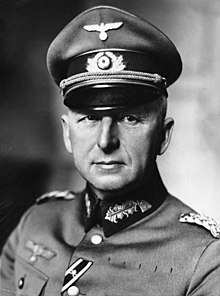Erich von Manstein
| Erich von Manstein | |
|---|---|

Generalfeldmarschall Erich von Manstein
|
|
| Birth name | Fritz Erich Georg Eduard von Lewinski |
| Born |
24 November 1887 Berlin, Kingdom of Prussia, German Empire |
| Died | 9 June 1973 (aged 85) Irschenhausen, Bavaria, West Germany |
| Allegiance |
|
| Years of service | 1906–44 |
| Rank | Generalfeldmarschall |
| Commands held | |
| Battles/wars | |
| Awards | Knight's Cross of the Iron Cross with Oak Leaves and Swords |
| Relations |
|
| Other work | Served as military advisor to the West German government |
Fritz Erich Georg Eduard von Lewinski, known as Erich von Manstein (24 November 1887 – 9 June 1973), was a German commander of the Wehrmacht, Nazi Germany's armed forces during the Second World War. He attained the rank of field marshal.
Born into an aristocratic Prussian family with a long history of military service, Manstein joined the army at a young age and saw service on Western Front and Eastern Front during the First World War (1914–18). He rose to the rank of captain by the end of the war and was active in the inter-war period helping Germany rebuild her armed forces. In September 1939, during the invasion of Poland at the beginning of the Second World War, he was serving as Chief of Staff to Gerd von Rundstedt's Army Group South. Adolf Hitler chose Manstein's strategy for the invasion of France of May 1940, a plan later refined by Franz Halder and other members of the OKH. Anticipating a firm Allied reaction should the main thrust of the invasion take place through the Netherlands, Manstein devised an innovative tactic—later known as the Sichelschnitt ("sickle cut")—that called for an attack through the woods of the Ardennes and a rapid drive to the English Channel, thus cutting off the French and Allied armies in Belgium and Flanders. Attaining the rank of general at the end of the campaign, he was active in the invasion of the Soviet Union in June 1941 and the Siege of Sevastopol (1941–1942), and was promoted to field marshal on 1 July 1942. He also participated in the Siege of Leningrad.
...
Wikipedia
